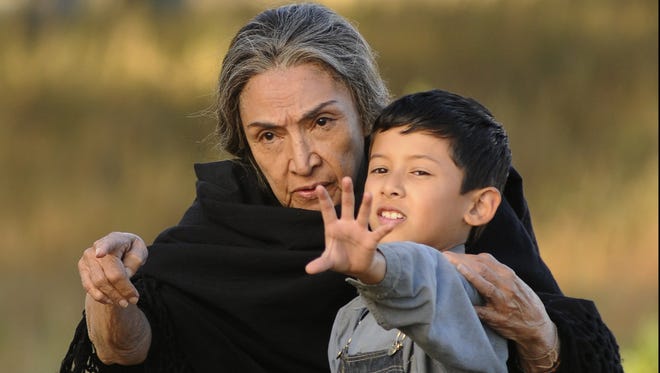'Bless Me, Ultima' has spirit but not much magic

- USATODAY Review%3A * * 1/2 out of four
- Stars%3A Miriam Colon%2C Luke Ganalon%2C Dolores Heredia%2C Benito Martinez%2C Castulo Guerra%2C Joaquin Cosio
- Rated PG-13%3B Runtime%3A 1 hour%2C 42 minutes%3B Opens Friday nationwide
Bless Me, Ultima has its earnest heart — and setting — in the right place.
Based on Rudolfo Anaya's eponymous magical realist novel about the mestizo experience, the film is set in 1944 and centers on Antonio (Luke Ganalon), a 7-year-old Mexican-American boy, and his bond with Ultima (Miriam Colon), a mysterious elderly healer who opens his eyes to spiritual wonders and the splendors of nature.
The visually stunning film (* * ½ out of four; rated PG-13; opening Friday nationwide) was shot in New Mexico, making good use of authentic locations.
Stretches of dialogue are sometimes rather clunky, especially when juxtaposed with the lyrical voice-over narration by Alfred Molina, which consists of passages from Anaya's poetically written book. The adaptation, by writer/director Carl Franklin (Devil With a Blue Dress), is respectful to its source but hampered by an occasionally flat quality and some stiff acting.
Ultima comes to stay with Antonio and his family amid local gossip that she's a witch. What she is, though, is a curandera, a Latina medicine woman. The eightysomething Ultima is respected in Antonio's New Mexico farming community for her herbal healing remedies. But she's also feared for her use of mysticism and magical spells. She and Antonio find that they are kindred spirits, and Ultima embarks on his tutelage in the healing power of native plants.
But Ultima clashes with Tenorio (Castulo Guerra), a local villager, and his trio of daughters, who dabble in black magic. Tenorio's nasty vengeance imperils the plucky Antonio.
Meanwhile, Antonio's family is splintering. His three older brothers return from fighting in World War II with a desire to strike out on their own, upsetting their mother (Dolores Heredia) and father (Benito Martinez), who had expected their sons to work on the family farm.
The film hints at, but skirts around, issues of religion, the immigrant experience and poverty. But in the locals' treatment of Ultima and in his classmates' attitudes toward Antonio, Franklin shows how a community can undermine its own citizenry through idle gossip.
Franklin stops short of deeply probing socio-cultural problems. Serious events, such as lynch mobs, a child's death and the violence of locals, are glossed over in favor of bucolic images.
The boy witnesses violence and random tragedy and grapples with confusion. The focus on Antonio seems unresolved. Theological debates are posited but not explored, nor are the traumatic realities of what Antonio observes during Ultima's otherworldly removal of a curse.
But Antonio does learn to question authority and regard the world from a different perspective, thanks to wise old Ultima.
What might have made Bless Me, Ultima more powerful would have been additional scenes with its mystical title character.